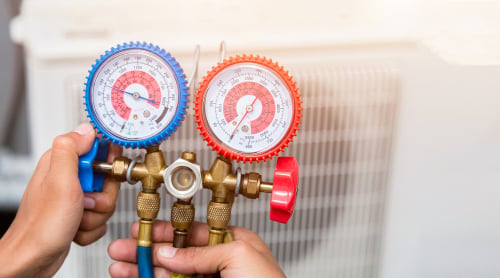
As Summer heats up, so does the strain on your rental property’s HVAC system. While everyone agrees that preventative maintenance is vital, many landlords and tenants wonder who is really responsible for what? Below we help you answer that question by discussing landlord responsibilities for HVAC maintenance along with tenant rights and prevention tips to extend the life of your system.
Summer HVAC Preventative Maintenance Checklist
Preventative maintenance is the best defense against more costly and extensive HVAC repairs. As a landlord, extending the life of your system while keeping your tenants comfortable should be a priority. Many HVAC companies offer convenient service plans to make maintenance stress free and automatic process for a reasonable rate. Check out these typical maintenance procedures below to keep your HVAC running smoothly all Summer long.
- Check or replace filters and batteries
- Clean condenser and evaporator coils
- Clean drain lines for proper flow and clear drain pans of any standing water to avoid overflows
- Replace any worn pulleys and belts
- Inspect ducts for mold, dust, and debris
- Check refrigerant charge
- Test the thermostats controls
- Inspect electrical systems, fan motor, and connections
- Check blowers and blades to ensure proper airflow
- Lubricate all moving parts
- Inspect cabinet for leaks and check cabinet door for secure closure
- Check for debris around the outside unit
Who’s Responsible for HVAC Service and Maintenance?
Maintenance repairs are inevitable, but in a rental, who does what? Your lease should clearly define maintenance responsibilities and expectations from the start to avoid confusion. Continue reading as we break down various tenant and landlord responsibilities for HVAC.
Typical HVAC Maintenance
- Changing Air Filters Quarterly (at minimum)
- Changing Thermostat Batteries
- Routine HVAC Maintenance Checks
- HVAC Repairs
Tenant Responsibility for Typical HVAC Maintenance
Changing Air Filters
A simple task that can save big is changing or cleaning the air filter. Depending on the system, it is a good idea to replace this quarterly to keep the system running efficiently. This responsibility almost always falls on the tenant and is at their own cost.
Changing Thermostat Batteries
Maintaining thermostat batteries is another easy but essential task a tenant can perform on their own. When thermostat batteries are low, the HVAC has difficulty receiving the message to turn on. Always provide the thermostat manual to the tenant whenever possible to make the battery changing process quick.
Landlord Responsibility for Typical HVAC Maintenance
Routine HVAC Maintenance Checks
Routine HVAC check-ups by a qualified professional can drastically extend the life of your HVAC units. This is typically a landlord’s responsibility and is done at least twice per year as the unit changes from heating to air conditioning needs. Consider a routine maintenance plan with a local HVAC provider.
HVAC Repairs
Even with regular maintenance, parts can still malfunction and break without warning. When they do, it is up to the landlord to make necessary repairs. These repairs need to occur promptly, as some states allow tenants to “Repair and Deduct.” This means if the landlord fails to take action, the tenant make repairs and deduct the cost from the rent amount. That said, if the repair needed is due to the tenant’s misuse or neglect of the unit, they are financially responsible for the repairs.
Are Landlords Required to Provide Air Conditioning?
For the most part, landlords are not required to provide air conditioning, even though it is considered a necessity for most renters. While laws do vary by state and region, air conditioning is an amenity, not a need. Landlords must provide a general conscience of habitability, which means the home needs to be safe, sanitary, and secure. When describing habitability, it typically includes the following items:
Expectation of Habitability
- Working systems to include electric, gas, heat, electric, and plumbing
- Operational fixtures to include sinks, toilets, tub or shower
- Access to hot water
- Non-leaking roofs and free of water damage
- Secure entry via locking doors
- Free of potential health hazards such as asbestos, lead, and mold
- Receptacles for proper disposal of garbage
- Proper egress per local building code
- Working smoke and carbon monoxide detectors
What if Air Conditioning is an Amenity?
While it is not required, many landlords do have AC in their rental units. If included with the unit as an amenity, the landlord is responsible for keeping the system in working order. Just as you would repair of replace an included appliance, HVAC requires the same care and attention.
Whether it is Summer or Fall, your rental property’s HVAC system will need attention. By understanding landlord responsibilities for HVAC maintenance along with tenant rights, you can ensure you get the most from your system. Are you searching for a stress-free way to manage the day to day tasks of your rental property? Contact a local Harford county property manager today!
